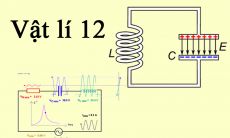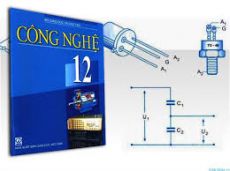Read the following passage and mark the letter A, B, C, or D on your answer sheet to indicate the correct answer to each of the questions from 28 to 34.
Because the low latitudes of the Earth, the areas near the equator, receive more heat than the latitudes near the poles, and because the nature of heat is to expand and move, heat is transported from the tropics to the middle and high latitudes. Some of this heat is moved by winds and some by ocean currents, and some gets stored in the atmosphere in the form of latent heat. The term “latent heat” refers to the energy that has to be used to convert liquid water to water vapor. We know that if we warm a pan of water on a stove, it will evaporate, or turn into vapor, faster than if it is allowed to sit at room temperature. We also know that if we hang wet clothes outside in the summertime, they will dry faster than in winter, when the temperature is lower. The energy used in both cases to change liquid water to water vapor is supplied by heat - supplied by the stove in the first case and by the Sun in the latter case. This energy is not lost. It is stored as vapor in the atmosphere as latent heat. Eventually, the water stored as vapor in the atmosphere will condense to liquid again, and the energy will be released to the atmosphere.
In the atmosphere, a large portion of the Sun’s incoming energy is used to evaporate water, primarily in the tropical oceans. Scientists have tried to quantify this proportion of the Sun’s energy. By analyzing temperature, water vapor, and wind data around the globe, they have estimated the quantity to be about 90 watts per square meter, or nearly 30 percent of the Sun’s energy. Once this latent heat is stored within the atmosphere, it can be transported, primarily to higher latitudes, by prevailing, large - scale winds. Or it can be transported vertically to higher levels in the atmosphere, where it forms clouds and subsequent storms, which then release the energy back to the atmosphere.
Câu 28 : The passage mainly discusses how heat ___________________
Hãy suy nghĩ và trả lời câu hỏi trước khi xem đáp án
Lời giải:
Báo saiBài đọc chủ yếu thảo luận về việc bằng cách nào mà nhiệt ___________________
A. được biến đổi và luân chuyển trong khí quyển của trái đất
B. được dòng hải lưu luân chuyển
C. có thể được các nhà khoa học đo lường và phân tích
D. di chuyển quanh xích đạo trái đất
Dẫn chứng: Because the low latitudes of the Earth, the areas near the equator, receive more heat than the latitudes near the poles, and because the nature of heat is to expand and move heat is transported from the tropics to the middle and high latitudes. Some of this heat is moved by winds and some by ocean currents, and some gets stored in the atmosphere in the form of latent heat.
(Do vĩ độ thấp của trái đất nên các vùng gần xích đạo nhận được nhiều nhiệt hơn vĩ độ gần cực và bởi vì bản chất của nhiệt là lan truyền và di chuyển nên nhiệt được luân chuyển từ các vùng nhiệt đới đến các vĩ độ trung bình và cao. Một số lượng nhiệt này được di chuyển bởi gió và một số bởi dòng hải lưu, và một số được lưu trữ trong khí quyển ở dạng nhiệt ẩn.)
Chọn A
Câu 29 : The passage mentions that the tropics differ from the Earth’s polar regions in which of the following ways?
Hãy suy nghĩ và trả lời câu hỏi trước khi xem đáp án
Lời giải:
Báo saiBài đọc đề cập đến các vùng nhiệt đới khác với các vùng cực của trái đất như thế nào?
A. Độ cao của việc hình thành đám mây trong khí quyển
B. Lượng nhiệt mà chúng nhận được từ mặt trời
C. Sức gió trên phạm vi rộng
D. Sức mạnh của dòng hải lưu
Dẫn chứng: Because the low latitudes of the Earth, the areas near the equator, receive more heat than the latitudes near the poles, and because the nature of heat is to expand and move, heat is transported from the tropics to the middle and high latitudes.
(Do vĩ độ thấp của trái đất nên các vùng gần xích đạo nhận được nhiều nhiệt hơn vĩ độ gần cực, và bởi vì bản chất của nhiệt là lan truyền và di chuyển nên nhiệt được luân chuyển từ các vùng nhiệt đới đến các vĩ độ trung bình và cao.)
Chọn B
Câu 30 : The word “convert” is closest in meaning to ___________________ .
Hãy suy nghĩ và trả lời câu hỏi trước khi xem đáp án
Lời giải:
Báo sai- mix (v): trộn
- change (v): biến đổi
- adapt (v): thích nghi
- reduce (v): giảm
“The term “latent heat” refers to the energy that has to be used to convert liquid water to water vapor.”
(Thuật ngữ “nhiệt ẩn” đề cập đến năng lượng được sử dụng để chuyển đổi nước lỏng thành hơi nước.)
Do đó: convert = change: biến đổi, chuyển đổi
Chọn B
Câu 31 : Why does the author mention “the stove” in the passage?
Hãy suy nghĩ và trả lời câu hỏi trước khi xem đáp án
Lời giải:
Báo saiTại sao tác giả đề cập đến “the stove-cái bếp” trong bài đọc?
A. Để mô tả nhiệt của mặt trời
B. Để minh họa hơi nước được lưu trữ như thế nào
C. Để chỉ ra năng lượng được lưu trữ như thế nào
D. Để đưa ra một ví dụ của nguồn nhiệt
Dẫn chứng: We know that if we warm a pan of water on a stove, it will evaporate, or turn into vapor, faster than if it is allowed to sit at room temperature. We also know that if we hang wet clothes outside in the summertime, they will dry faster than in winter, when the temperature is lower. The energy used in both cases to change liquid water to water vapor is supplied by heat - supplied by the stove in the first case and by the Sun in the latter case.
(Chúng ta biết rằng nếu chúng ta đun một ấm nước trên bếp thì nó sẽ bay hơi, hoặc biến thành hơi nước nhanh hơn nếu nó được để ở nhiệt độ phòng. Chúng ta cũng biết rằng nếu chúng ta treo quần áo ướt bên ngoài vào mùa hè thì chúng sẽ khô nhanh hơn vào mùa đông, khi nhiệt độ thấp hơn, Năng lượng được sử dụng trong cả hai trường hợp để biến đổi nước lỏng thành hơi nước được cung cấp bởi nhiệt - được cung cấp bởi cái bếp trong trường hợp đầu tiên và bởi mặt trời trong trường hợp sau.)
Chọn D
Câu 32 : According to the passage, most ocean water evaporation occurs especially _________ .
Hãy suy nghĩ và trả lời câu hỏi trước khi xem đáp án
Lời giải:
Báo saiTheo bài đọc, hầu hết sự bốc hơi nước đại dương xảy ra đặc biệt ___________________ .
A. ở quanh vùng vĩ độ cao hơn
B. ở các vùng ôn đới
C. do sức gió trên phạm vi rộng
D. do dòng hải lưu mạnh
Dẫn chứng: In the atmosphere, a large portion of the Sun’s incoming energy is used to evaporate water, primarily in the tropical oceans.
(Trong khí quyển, một phần lớn năng lượng của Mặt Trời được sử dụng để làm bay hơi nước, chủ yếu ở các đại dương nhiệt đới.)
Chọn B
Câu 33 : According to the passage, 30 percent of the Sun’s incoming energy __________
Hãy suy nghĩ và trả lời câu hỏi trước khi xem đáp án
Lời giải:
Báo saiTheo bài đọc, 30% của năng lượng đến từ mặt trời ___________________
A. được lưu trữ trong các đám mây ở vĩ độ thấp hơn
B. được luân chuyển bởi các dòng hải lưu
C. chưa bao giờ ra khỏi bầu khí quyển phía trên
D. được lưu trữ dưới dạng nhiệt ẩn
Dẫn chứng: By analyzing temperature, water vapor, and wind data around the globe, they have estimated the quantity to be about 90 watts per square meter, or nearly 30 percent of the Sun’s energy. Once this latent heat is stored within the atmosphere, it can be transported, primarily to higher latitudes, by prevailing, large - scale winds.
(Bằng cách phân tích nhiệt độ, hơi nước và dữ liệu gió trên toàn cầu, họ đã ước tính số lượng khoảng 90w/1m2, hoặc gần 30% năng lượng của mặt trời. Một khi nhiệt ẩn này được lưu trữ trong khí quyển thì nó có thể được luân chuyển, chủ yếu đến các vĩ độ cao hơn bởi các cơn gió thịnh hành có quy mô lớn.)
Chọn D
Câu 34 : The underlined word “it” refers to ___________________ .
Hãy suy nghĩ và trả lời câu hỏi trước khi xem đáp án
Lời giải:
Báo saiTừ "it" đề cập đến ___________________ .
A. mét vuông
B. năng lượng mặt trời
C. nhiệt ẩn
D. khí quyển
"Once this latent heat is stored within the atmosphere, it can be transported, primarily to higher latitudes, by prevailing, large - scale winds.”
(Một khi nhiệt ẩn này được lưu trữ trong khí quyển thì nó có thể được luân chuyển, chủ yếu đến các vĩ độ cao hơn bởi các cơn gió thịnh hành có quy mô lớn
Do đó: it = latent heat
Chọn C
Đề thi giữa HK1 môn Tiếng Anh 10 Cánh diều năm 2023-2024
Trường THPT Nguyễn Thị Minh Khai














